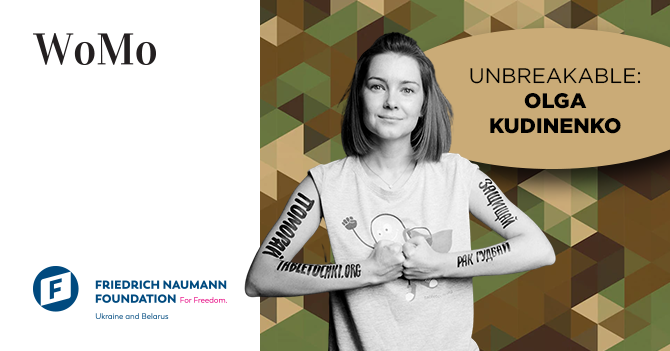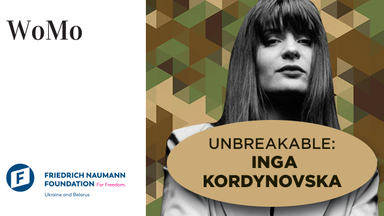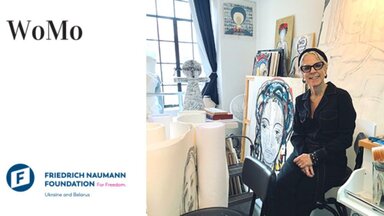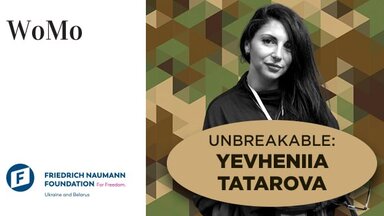Unbreakable / Nezlamni
“Nobody slept in the first several months”

Olga Kudinenko is the founder of Tabletochki, a charity foundation for children with cancer, a fundraiser and a Member of the National Children’s Hospital’s OKHMATDYT Board of Trustees. She traveled abroad with her mom and daughter shortly before the war, planning to return to Ukraine, but the war cancelled that plan. In the “UNBREAKABLE” project, she shared how the foundation helped evacuate children with cancer from dangerous territories, and spoke about establishing a foundation in the U.S. and helping Ukrainians, while she’s staying abroad.
“The start of the year was full of hopes for the foundation development”
I’ve been involved in charity for the past 11 years, the Tabletochki Foundation. My responsibilities at Tabletochki include working with our strategic partners, strategic vision and foundation development. In the past two years, we’ve been working together with the team on one big project. A month before the war, we had a meeting with the supervisory board of this project to discuss the plans for the year. A week before the war, we met with a potential partner, got the first pledge of a donation. I am talking about some ten million US dollars. We received this pledge on February 15, a special day, because it is the International Childhood Cancer Day. It was rather symbolic to receive a pledge of a donation for children on this day. It all seemed wonderful, and we were starting to plan our annual fundraiser, and new things for the foundation. This year was supposed to be the year of expectations of new development and improvement of childhood cancer treatment in Ukraine.
I actually did not believe that something could happen. Even as we were meeting with the project’s supervisory board, which included influential and wealthy people, everybody was positive and everybody said that it was all an exaggeration. Nobody could even imagine the scale of the things happening now. Everyone planned to stay in Ukraine, which actually turned out exactly like that; only their working duties changed.
In the middle of December, I bought an apartment in Kyiv and started refurbishing it. There was talk in Ukraine even on February 15 that the sky may be closed over the country, and we had a trip to Thailand planned. I even had a thought back then that maybe we should leave earlier, but I didn’t, because I had meetings scheduled. The only thing I did was to enquire whether I would get a refund for my hotel reservation if my flight was cancelled.
On February 18, my daughter’s school break started and together with her and my mom we went to the International Boryspil Airport. I even posted a funny Instagram story about how my mom brought the wrong passport. We were planning to go for a week and come back. We were supposed to return to Ukraine on March 1, but we didn’t, because the war started on February 24. I learned about the war at 10am because of the time difference with Kyiv. My first reaction was to go back home, but I knew that I wouldn’t be much of a help. Unfortunately, I cannot do anything useful in that situation. I hadn’t driven a car in five years, so I wouldn’t have been able to even deliver anything. I have a brother whose children are 12, 6 and 3. My brother has a house near Makarov, where he took his wife, children and our father. They stayed there for 5 days and then went to Germany. My father stayed at the house. We had no communication with him because there were problems with electricity. Once every few days, my father would drive to some field to call us. Finally, we convinced him to leave. So, after two weeks of the war, my father was able to flee Makarov together with my puppy that had been staying at a dog training center located between Irpin and Bucha since the beginning of the war. My assistant brought the puppy to my father and I am very grateful to him for that.
Helping hospitals and evacuation of children with cancer: the first months of the war
In the first hour of the war, I wrote to the directors of the Tabletochki Foundation in our work chat and asked them whether it was true and the war did indeed start, because despite all Facebook posts and news I still could not believe that it was possible. We immediately paid salaries to our employees in advance, because it was the end of the month and nobody knew how the banking system would operate.
Then, we started to have a daily roll call, with everybody saying where they were and whether they were safe. We started calling hospitals, where children with cancer that we were helping were and asking what the hospitals needed. Some stores were closed, so we called the Epicentr team and asked them to provide us with adapters, extension cords, so that the doctors could use them in basements. They gave us contacts for their warehouse manager and told us to go and take anything we needed. They did, however, warn us that the place was under fire. We found a volunteer who went to the center and picked up the adapters, and brought everything to the hospitals. Next, we provided the hospitals with food, actually with anything they needed, because it was impossible to predict how the events would develop. All our partners reacted extraordinarily, providing assistance for free and very promptly.
The second thing we did on the first day of the war was to contact St. Jude Children’s Research Hospital, our partner in the U.S. It is the best hospital in the world for treatment of childhood cancer. We’ve been partners since 2018. We were able to appreciate the value of this partnership during the war.
Within 24 hours, they deployed an office for helping children with cancer in Ukraine. We built an evacuation route for children with cancer. This is what it looked like: depending on the location of the hospital, we brought children to Okhmadyt in Kyiv, and then to the West Ukrainian Specialized Children’s Medical Center in Lviv, from where they were taken to Poland.
Children were evacuated to UNiCORN clinic in Poland, where they were given initial examination, and had their condition improved. Then the children were transferred to hospitals in other countries to undergo treatment. Overall, children with cancer are currently undergoing treatment in 16 countries. More than 1,000 children were evacuated under the SAFER Ukraine initiative. I also separately helped evacuate orphans. I remember everyone was on the phone almost 24h; people slept somewhere between 3am and 6am, when nobody called. And then it was back to business again.
Fundraising and registering the foundation in the U.S.
Around March 26 I realized that I had to go to the U.S. to raise funds to support sick children and to ensure that we kept our promise to those we had already been helping. On that day, I flew to the States for six weeks together with my colleague Svitlana Puhach. I ended up spending 7 weeks there.
We met with different partners, sought funding and support. We tried to understand how things worked in the U.S., because reports started coming about the destructions in Ukraine and I realized that the need for support is great. Before, I thought that we could do everything on our own in Ukraine, but clearly the involvement of international partners was very much needed. The needs are great and we require assistance.
I came to the U.S. and registered the foundation there. Now I am waiting for the license. I know that it will take two-three, or maybe even five years to build the foundation in the U.S.
The foundation in the U.S. will work to raise funds to help Ukrainian children and the assistance programs will be implemented in Ukraine by the Tabletochki Foundation, same as before.
“I will live in two countries”
We were going for a week’s vacation, so I had no jewelry I could pawn, if necessary. My suitcase was full of swimsuits and dresses. I had some cash. I didn't even take my laptop with me. I had it brought to me from Kyiv. When the war started, I hoped that it would be over very quickly. I truly believed that we would return on March 1. I cancelled the ticket only a day before the flight. I decided to stay abroad, because of my daughter among other reasons. She didn’t witness the atrocities of the war and that’s a good thing.
I extended my hotel accommodation for five more days, because I had hoped that everything would surely end in two weeks. Then I realized that everything would not end that quickly and started to think of what to do next, where to live, because I had a child with me. I love her so much. She is the best gift that life has given me. But at that time I was a bit envious of the people who either didn’t have children or had teenagers or adult children. The former do not have the responsibility of having a child and the latter have more freedom, because they can send their child to a school alone, for example. That wasn’t the case for me. My daughter is six and I have to be with her. I also have many children under our care that I have to help.
I began thinking that I needed to choose a country whose language I spoke in order to raise funds. I ruled out almost all European countries, because I do not have the resources or time to learn a new language. I started considering Canada, the U.S. and the UK. I dismissed the UK, as a lot of Ukrainians already fled there. I’d never been to Canada, but I had an impression that it is a ‘calmer’ country, so it wouldn’t be good for me. I chose the U.S., because I studied the entire philanthropy culture in the U.S. and it is a big country with many opportunities. I believe that I will be able to build a foundation there, as I’ve done it with the Tabletochki Foundation to support Ukrainian children from abroad. I think I will be living in two countries.
My daughter is now with my dad in Germany. She is coming to New York in a week, once I’m done with getting our rented apartment ready. Then, I will be able to travel to Ukraine and work between two countries. I have a big experience of living in two countries and I know what the price of it will be.
I’m spending a lot of time now on living arrangements, because the service is quite poor in the U.S. I spend several hours every day on the phone talking to the delivery services, because in addition to having to provide long explanations, the connection breaks regularly. Here’s an example: I ordered chairs and it turned out they are not stable. I called to arrange for someone to have a look. The service promised to send a handyman first on Monday, then on Wednesday, and in the end nobody showed up for a week. Finally, I was told to return the chairs and order new ones with the assembly service. This happens with every delivery. Instead of five curtains, I received four, or instead of a wardrobe, I received a bed, because there had been a mix-up with the addresses. Honestly speaking, all these talks with the service are exhausting, although I am not complaining and treating it with humor. I am very grateful that we are safe.
In addition to dealing with the apartment, I am working on establishing the foundation, developing relations, meeting people. Together with the team we are deciding on which projects to keep in Ukraine, which ones to add, because we need to adapt. Not all projects will work, therefore we are transforming some of them.
We have just finished the website for raising funds in the U.S. and I am hoping to start fundraising activity in September.
“I didn’t experience the feeling of loneliness or reflection”
I didn’t experience the feeling of loneliness abroad, because I was working all the time. I did not have time to reflect on things. I believe that the majority of Ukrainians have not yet reflected on everything, because it is very difficult to realize how much has happened, how many atrocities we are still not aware of. My mind still cannot grasp of what is happening to me and my people. I know them all; they are successful and self-realized.
Yesterday, a Ukrainian came to me. He fled the war. I called him to help assemble furniture. It turned out he is a man from Lysychansk that he fled together with his wife on March 15. He is older than 60 and worked his entire life as a miner. He has two apartments in Lysychansk and Crimea. He says that he worked hard all his life to be able to enjoys life now. My parents are the same. They worked hard to have a comfortable life. But now, this man has to assemble furniture. His apartment in Lysychansk is partially ruined – there is no roof.
I am amazed by the Ukrainian strength, our resilience, how we act, while being refugees. I am amazed by the resilience of this man and everyone I’m observing. Everyone simply accepted it and started working. To me, this is inspiring that we are so strong and resilient.
The people concentrate on what’s dear to them. This was clear even at the beginning of the war. Foreigners sympathize with us, support us, but they will never be able to understand what Ukrainians are going through. Those who have had the experience of living through a war, they can understand, but all others can’t. It is normal, because I don’t want these people to have this kind of experience. It is the same way we will never be able to understand a parent who lost their child to cancer. Do we want that experience? Of course not and it is okay.
The war changed our values
There is a realization now that our skills and knowledge are the most valuable things that we have. And also human relations. I’ve lost the skill to rejoice at material things. Before, I loved to buy something, or think about buying things. Now the approach is different: “I need to buy the cheapest chairs, because I don't know how long I will be here.” Everything seems unimportant, not worth spending money. It seems you cannot be happy about the things you used to enjoy. Many people I’ve spoken with share this feeling.
Last year, I bought a Christmas set at a store in the U.S. I thought it would last for a hundred years, that I would use it every year for one month. It was a feeling of the future, the one I no longer have.
What I want the most is to return to the Kyiv that I left on February 18. I want to enter my apartment and see it the way I left it and live as before. But I now realize that it is impossible, because I no longer have my rented apartment and all the people I communicate in Kyiv with have left.
I am working with what I have now. I don’t have any reflection, because I know that I don’t have a time machine to go back to the past. We are simply adapting to these conditions.
What I miss the most is the ability to call someone and say: “Let’s meet in 15 minutes on Yaroslaviv Val”, which is not far from my rented apartment. Or just drop by a friend who lived nearby. I miss having the ability to go to any restaurant and meet acquaintances. I miss our conversations, making peaceful future plans, the light vision of the future.
We are paying a very high price for this victory. I sometimes read on social media that after the victory people plan to party and celebrate for several days. But to me, it seems this will be the day of great mourning, because we have lost so many soldiers, and people. The price of this victory is too great. We, Ukrainians, are paying an unreal price, but we will persevere.
Author of the article: Victoria Pokatis
This article was prepared by the editorial office of Ukrainian women´s magazine WoMo as a part of the "Unbreakable" author´s special project in cooperation with Friedrich-Naumann-Foundation for Freedom in Ukraine supported by the Federal Foreign Office.

“War is another case I need to win,” Inga Kordynovska on the humanitarian centre in Odesa

Inga Kordynovska is the owner of a law firm, who despite the threat of occupation of Odesa at the beginning of the war stayed in the city and established the Humanitarian Volunteer Centre in Odesa and then two more projects to help internally displaced people, mothers in particular. In the “Unbreakable” project, Inga shares how legal practice helped her during the war and why humanitarian aid is not her main goal in helping those affected by the war.
Ola Rondiak: "Today Ukraine reclaims its identity"

Ola Rondiak, a U.S. artist of Ukrainian origin, was born and raised in emigration. After Ukraine gained independence, she decided to return to her homeland. The artist is now witnessing how Ukrainians are once again fighting for their identity. And that is what she shows in her works. In an interview for WoMo, Ola shares what she felt when the war started, where she finds strength to fight and how she creates art to help the army. This article was prepared by the editorial office of Ukrainian women´s magazine WoMo as a part of the author´s special project "Unbreakable" in cooperation with Friedrich-Naumann-Foundation for Freedom in Ukraine.
Education against war

Yevheniya Tatarova, director of the Kiev office of the Continuing Education School for English Teachers, became a displaced person for the second time at the beginning of the war. To support the Ukrainian army, she held a seminar with English teachers lasting several hours, which raised 4,000 US dollars. She handed over the collected donations to the Serhij Prytula Foundation for the Ukrainian military. In the project "The Indomitable", Tatarova talks about finding new meanings during war and how the English language helps the Ukrainian army.